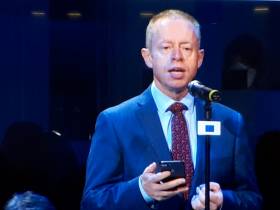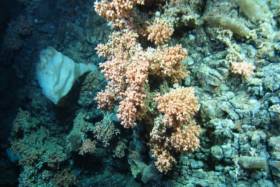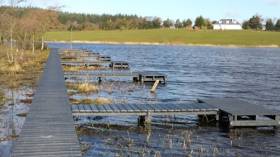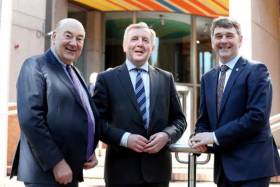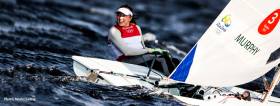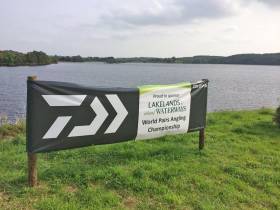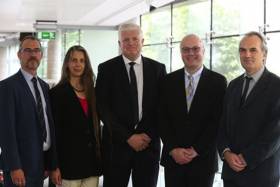Displaying items by tag: Funding
Commitments To €6M Funding For Seabed Mapping & Marine Research Welcomed
#MarineScience - The Marine Institute has welcomed commitments of €6 million in funding for seabed mapping and marine research announced at the fourth Our Ocean Conference in Malta last week.
Ciaran Cannon, Minister of State for International Development, addressed representatives from more than 200 countries at the EU conference, stressing the importance of promoting and protecting the world's marine resources for present and future generations.
Aside from the new funding for mapping and research, Minister Cannon also announced the roll-out of a 'groundbreaking' Global Citizenship marine environment education module for school children from September 2017 onwards.
“This programme will increase ocean literacy by fostering understanding of the important role our oceans play in our lives, how individual actions can affect them and how we can act together to protect them,” he said.
Marine Institute chief executive Dr Peter Heffernan explained that the new module supports the aims of the institute’s own Explorers Education Programme “to build on Ireland's marine and maritime heritage by increasing awareness of the value, opportunities and social benefits of our ocean wealth and identity.”
Meanwhile, Minister Cannon committed to €320,000 in funding to the 2017 Clean Coasts programme and its more than 550 volunteer groups established in Ireland to date.
Also noted was an expansion of the 2015 Fishing for Litter programme, and continued contributions to support developing countries engagement at the UN on issues relating to marine governance.
In addition, Minister Cannon reaffirmed Ireland's commitment to prohibit the sale or manufacture of certain products containing microbeads, announced at the UN in June of this year.
Offshore Earthquakes & Deep Sea Corals Among 26 Projects Awarded €45m By SFI
#MarineScience - Offshore earthquakes and cold water coral in subsea canyons in Irish waters are among 26 projects awarded €45 million in research investment through the Science Foundation Ireland's Investigators Programme, announced last week by Minister of State for Training and Skills, John Halligan.
“This funding recognises some of Ireland’s top researchers and enables them to advance vital research areas in Ireland,” said the minister. “I am confident that the teams being supported will generate important new scientific breakthroughs.”
The 26 research projects will support 94 research positions over the next five years.
“In addition, today’s investment provides 20 companies with access to invaluable expertise and infrastructure across the country,” said Minister Halligan. “These collaborations between industry and academia are integral to further enhancing Ireland’s reputation for research excellence.”
To strengthen and accelerate research in key strategic areas of national interest, Science Foundation Ireland (SFI) collaborates with several funding agencies and public bodies through the SFI Investigators Programme.
Six of the research projects received co-funding worth a total of €3 million from Teagasc, the Geological Survey of Ireland, the Marine Institute, and the Environmental Protection Agency. The Marine Institute and the Geological Survey of Ireland are co-funding two marine science awards with SFI to the value of €2.65 million.
Professor Sergei Lebedev of the Dublin Institute of Advanced Studies (DIAS) has been awarded €1,248,989 to investigate the structure, evolution and seismic hazard of Ireland’s offshore territory.
With 90% of Ireland’s territory offshore, it represents vast resources but also hazards, with offshore earthquakes posing the biggest risk with the potential to trigger undersea landslides and tsunamis.
Prof Lebedev’s team will for the first time deploy an array of ocean-bottom, broadband seismometers offshore which, together with existing arrays onshore, will cover the entire Irish territory.
Professor Andy Wheeler of University College Cork has been awarded €874,329 to explore and monitor cold water corals in submarine canyons in the deep ocean and determine their sensitivity to climate change and fisheries and oil industry impacts.
Prof Wheeler’s team will used advanced robotic technology and novel 3D visualisation and will make recommendations for sustainable responsible fisheries and hydrocarbon activity and for effective management during climate change.
Dr Ciaran Kelly, R&D manager at the Marine Institute, said, “The Marine Institute is delighted to partner with SFI again in co-funding these important projects through the investigators programme, together with our INFOMAR programme partners, Geological Survey of Ireland.
“This collaboration will accelerate our knowledge of key processes of the deep ocean bringing longstanding benefits to society.”
For more information on the 26 projects funded through the SFI Investigators Programme see www.sfi.ie.
#Angling - Sean Kyne TD, Minister of State with responsibility for Inland Fisheries, has today (Wednesday 9 August) welcomed a new €2 million funding call from Inland Fisheries Ireland (IFI) for angling projects and conservation initiatives.
The funding call, which consists of three separate funding streams, will help ensure that Ireland’s fish stocks and angling infrastructure are protected and enhanced into the future.
The 2017 IFI funding call is made up of the following funds:
- Salmon Conservation Fund to a maximum of €500,000
- Midland Fisheries Fund of €50,000
- National Strategy for Angling Development Fund (NSAD) €1,500,000
“As minister with responsibility for Inland Fisheries, I have ensured that significant funding under the National Strategy for Angling Development was available from my Department in 2017 to help Inland Fisheries Ireland develop a wide ranging investment initiative,” said Minister Kyne.
“I welcome the fact that the funding programme is rooted in community-led actions and I support Inland Fisheries Ireland in its enhancement plans. I also want to encourage angling bodies, community groups and local authorities to take up the funding opportunity and meet the development challenge at local, regional and national level.”
IFI is inviting applications for funding for projects across a number of areas, from fisheries habitat enhancement and sustainable development works to marketing and promotional projects for angling.
Applications are invited from groups, associations, clubs, local authorities or other appropriate bodies looking to improve Ireland’s fisheries resource.
IFI chief executive Dr Ciaran Byrne said: “Today’s announcement sees Inland Fisheries Ireland make over €2 million available to communities nationwide, for projects which will help contribute to an accessible and sustainable world class inland fisheries and sea angling resource for all.
“We want to ensure that we continue to invest in conservation, while also developing our angling offering in Ireland. While the National Strategy for Angling Development funding stream focuses on improving angling access with a view to attracting more domestic and overseas anglers to the pursuit, the Salmon Conservation Fund and Midland Fisheries Fund re-invest the contributions of anglers into valuable initiatives which a view to promoting the recovery of salmon stocks and habitats and supporting sustainable development works in the Midlands respectively.”
IFI will hold regional information workshops for those interested in applying for funding with a view to giving participants a better understanding of the various funding streams and how they can apply via an online system.
The workshops will take place at the following locations and dates (7pm each date unless otherwise stated):
- Tuesday 29 August - Clonmel Park Hotel, Clonmel, Co Tipperary
- Wednesday 30 August - Castle Hotel, Macroom, Co Cork
- Thursday 31 August - Maldron Hotel, Southern Ring Road, Roxboro, Limerick
- Monday 4 September - CityNorth Hotel, Gormanston, Co Meath
- Tuesday 5 September - Great National Hotel, N26 Dublin Road, Ballina, Co Mayo
- Wednesday 6 September - Menlo Park Hotel, Headford Road, Co Galway
- Tuesday 12 September - Harvey's Point Country Hotel, Lough Eske, Donegal Town
- Thursday 14 September - Athlone Springs Hotel, Monksland, Athlone, Co Roscommon
- Tuesday 19-Thursday 21 September (all day) - National Ploughing Championships, Screggan, Tullamore, Co Offaly
Members of the public who will be attending the workshops are asked to RSVP to [email protected], indicating which workshop they will be going to along with their name and contact details.
The closing date for applications to IFI’s 2017 funding call is Friday 13 October. For more information and to apply, see the IFI website HERE.
#MarineResearch - The Marine Institute has announced a €2m Marine Infrastructure Call for 2017 with awards of between €20,000 and €200,000.
Applications are invited from legal entities (higher education institutes, public research institutes, small-medium enterprises, etc) on the island of Ireland with the appropriate scientific and technical qualifications and research expertise.
Marine Minister Michael Creed launched the initiative earlier this week at the Marine Institute’s Dublin office, where he also met some of the researchers successful in winning research funding through last year’s call: such as the national ship-time programme, the National Biodiscovery Laboratory, and research on ocean acidification.
“The range of projects funded by the Marine Institute through the Marine Research measure shows that Ireland’s marine researchers are carrying out cutting edge research to tackle national and global societal challenges,” he said.
“This funding builds on the national research capacity established through previous initiatives such as the Sea Change Strategy. It is helping to deliver on ‘Ireland’s Integrated Marine Plan – Harnessing Our Ocean Wealth’ by investing in researchers and organisations that are developing expertise and networks to address national policy objectives.”
Minister Creed added: “With our strategic location on the edge of the Atlantic, we are investing in key projects at the cutting edge of ocean research. During 2016, I am delighted that €10.7 million was awarded by the Marine Institute through the Marine Research Measure. This was a significant increase in the level of investment in marine research in recent years.
“The investment reflects both the opportunities the ocean presents as well as the huge responsibility we have to understand and protect the ocean, which we know is a key life support system for our planet. The funding supports a total of 32 research positions, including 20 marine research jobs announced in January by An Taoiseach Enda Kenny.”
All information on the call – including Guidelines for Applicants and Terms of Reference – can be found on the Marine Institute website HERE.
The application closing date is Thursday 15 June. Any queries or clarifications should be submitted by email to [email protected]
Sailing & Rowing Get Sport Ireland Funding Boost As Rio Review Says Ireland Falls Short
#Tokyo2020 - Funding for Irish sailing and other watersports remains broadly unchanged in Sport Ireland’s allocations for National Governing Bodies in 2017 — though programmes encouraging women in rowing have received a boost.
However, the accompanying review of the Irish Olympic performance in Rio acknowledges that Ireland's medal target was not reached – raising questions of expectations for Tokyo 2020.
The report highlights that Ireland “does not fund sport seriously”, according to Irish Times sportswriter Johnny Watterson, who cites the absence of long-term funding in favour of annual, non-guaranteed allocations.
More than €20 million for sporting bodies and athletes, in line with last year’s allocations, was announced by Minister of State for Sport Patrick O’Donovan this week as Sport Ireland also published its review of the 2016 Olympic Games in Rio.
The 2017 investment comprises €1.8 million in direct athlete investment; €7.2 million in high performance programme funding; €10.8 million in National Governing Bodies core funding; and €600,000 for the Women in Sport Programme.
The Irish Sailing Association (€323k), Rowing Ireland (€210k), Irish Surfing Association (€65k) and Irish Underwater Council (€60k) will get sums unchanged from 2016, though Canoeing Ireland sees a cut in its allocation by €10,000 (€205k to €195k).
Sailing (€18k) and surfing (€7,000) also see unchanged sums for their Women in Sport programmes, but Rowing Ireland receives a boost to €45,000 from €35,000 in 2016.
Sport Ireland highlights that more than 15,000 women and girls participated in Rowing Ireland’s ‘Get Going Get Rowing’ programme last year, while over 300 took part in the Irish Surfing Women in Sport initiative, and more than 9,000 availed of the Swim Ireland programme for female participation.
In allocations for high performance programmes, the ISA’s share rises by €100,000 to €735,000 for 2017, while Rowing Ireland sees an even bigger boost in its HP grant from €400,000 last year to €525,000.
Canoeing Ireland, however, sees its HP allocation cut by almost 40% to from €65,000 €40,000.
Welcoming the increase in sailing investment, ISA high performance director James O’Callaghan called for perspective on the figures involved.
“We’re pleased with the €100,000 increase but the truth of the matter is we started off the year with a €60,000 deficit because of the cost of [competing in] Rio. So really, it’s status quo for sailing,” he said.
Athlete investment
In direct athlete investment, 16 international athletes are awarded ‘Podium’ funding for 2017 under the International Carding Scheme.
In rowing, Rio Olympic medallists Gary and Paul O’Donovan, along with Sanita Puspure, will each receive €40,000 in Podium funding, while Rio’s Laser silver medallist Annalise Murphy is the only sailor to qualify for that funding level.
Sinead Lynch, Claire Lambe (€20k each), Mark O’Donovan, Shane O’Driscoll and Denise Walsh (€12k each) round out the rowing recipients in the 2017 funding round.
Among other sailing recipients, Ryan Seaton and Matt McGovern each receive €20,000, Finn Lynch gets €12,000 and €16,000 goes to crew/transition athletes.
In canoeing and kayaking, Patrick O’Leary (para canoe), Tom Brennan, Liam Jegou, Jenny Egan and Michael Fitzsimon will each get €12,000 of International level funding.
Sailing ‘must diversify’
Meanwhile, Sport Ireland says its Rio Review provides a “blueprint” for campaigns heading into the Tokyo Olympics in 2020.
In sailing, two of Ireland’s four classes competed in Rio “performed at or near expectations”, with the others cites for “credible results”.
The report adds: “Given it has been 36 years since Ireland last won an Olympic medal, this is an extremely exciting achievement and provides evidence of the success of the longer term strategy that ISA has been following for many years now.”
In its recommendations for sailing going forward, the report says work is underway “to diversify income to support the performance programme.
“In sports like sailing with significant capital needs, allocating funding on an annual basis is unhelpful. The sport and the athletes would be far more able to launch and deliver credible and performance based campaigns if funding was known over a longer period.”
However, the report also suggests that care must be taken by the ISA to remain within its budget allocation or “consider how difficult decisions might be made to invest in classes
with realistic chances of medalling” or other significant success.
Sailing would also benefit from more class competition within Ireland, the report adds.
“The review has identified the timescale to remedy the problems [within sailing],” said the ISA’s O’Callaghan. “But when are we going to see action to fix it?”
The picture for rowing is also less rosy, as Sport Ireland says “a lack of development structure and pathway is preventing the identification and progression of rowers to international
level”.
Despite that warning, Sport Ireland remains confident that “the current situation of recent history and success within this Olympic cycle represents a very strong position to be in.”
Consistency in training camps and post-training sessions is recommended by the report, which also suggests the use of biometric data to inform team performance.
The full Sport Ireland Rio Review is available as a PDF to read or download HERE.
50 Angling Access Projects Get Funding From Inland Fisheries Ireland
#Angling - Inland Fisheries Ireland (IFI) has awarded 50 angling development projects with funding to the value of €500,000 in total as part of its Capital Works Fund.
The projects, which focus on improving angling access and infrastructure, are set to be delivered in 2017.
In total, applications for over 100 projects were received bringing the overall value of projects looking for funding to above €2 million.
Seán Kyne, Minister of State for Natural Resources, said: “I would like to congratulate the community groups who have been awarded this funding.
“The projects receiving funding are located in 19 counties across the country. They include the provision of angling boats and trailers to allow for improved access for education/youth initiatives and tourist anglers, upgrades to access roads and car parks at angling sites, construction of new fishing stands, styles and footbridges and the provision of informational signage.”
The Capital Works Fund was announced in October 2016 with local groups and individuals including local development associations, tidy towns, angling clubs and others invited to apply for funding.
The scheme is part of IFI’s National Strategy for Angling Development, which aims to ensure that Ireland’s fish stocks and angling infrastructure are protected and enhanced with a view to ensuring a sustainable habitat and delivering the economic, health and recreational benefits they offer to communities across Ireland.
IFI says it is aiming to grow the angling sector’s socio-economic contribution of €836 million per year by an additional €60 million annually through the strategy.
This will be achieved by driving angling participation among domestic and overseas visitors, which in turn is supported by improving access to fishing and developing angling infrastructure.
Suzanne Campion, IFI head of business development, said: “The Capital Works Fund has been overwhelmed by strong project applications and following a considered review process, we are delighted to announce the 50 projects which have secured support.
“The demand for improvements in angling access and development is evident. Rural communities across Ireland are engaged with angling and recognise the value of the fisheries resource to their local area.”
Campion added that IFI “has worked closely with angling clubs, individuals, community groups and chambers of commerce to inform them about the fund and the overall National Strategy for Angling Development.
“We hope to empower these stakeholders to improve access to angling in their areas and as a result deliver long term recreational and economic benefit to their communities.”
IFI received 90 expressions of interest across 21 counties in addition to the applications received for the Capital Works Fund, and it is expected that further funding for projects will be made in this area in the New Year.
The projects receiving funding under the Capital Works Fund 2016 are:
Cavan
- Hollybank Lake, Co. Cavan – Access Road and Car Park Improvements (€16,920) by Cavan County Council
- Lough Sheelin, Co. Cavan – Safety Measures Project (€3,618) by Cavan Cavan Council
- Bun Lough, Belturbet, Co. Cavan – Bun Lake Car Park and Access Road Improvements (€14,913) by Cavan County Council
- Putiaghan Lough, Belturbet, Co. Cavan – Lay-By Upgrade (€9,112) by Cavan County Council
- Nadreegeel Lough, Ballyjamesduff, Co. Cavan – Site Clearance, Car Park Improvement and Signage Development (€16,500) by Cavan County Council
Clare
- Swan Island, Lough Bridget – Swan Island Lough Bridget Upgrade of Angling Facilities (€10,000) by Tulla and District Coarse Angling Association
Cork
- River Ilen, Skibbereen – River Ilen Development Project for Recreational and Tourist Angling (€2, 750) by River Ilen Anglers Club
- Bandon River – Opening Access on the Bandon River (€3,770) by Bandon Angling Association
- Glenbeg Lake, Ardgroom, Beara – Glenbeg Lake Angling Access (€12,000) by Beara Trout Anglers
- Tibbotstown Carrigtwohill – Angling access and storage at Tibbotstown Reservoir (€19,042) by Glanmire & District Salmon & Trout Anglers Association
- Kilbarry – River Blackwater Access Improvement (€25,969) by Kilbarry Salmon Trout Anglers
Donegal
- Sessiagh Lough – Sessiagh Lough Boat Replacement (€6,000) by Dunfanaghy Angling Association
- Lough Keel – Lough Keel Car Park and Access Improvement (€1,050) by Letterkenny & District Anglers Association
- Lough na Toohey, Creeslough - Creeslough Development Plan. Lough na Toohey Angling Access Work (€3,500) by Creeslough & District Angling Association
- Crana River and Fullerton Pollen Dam Fisheries, Buncrana - Buncrana Anglers Fisheries Development Plan (€25,850) by Buncrana Anglers Association
Galway
- Clare River – Clare River Angling Access Developments (€14,720) by Cairde na Chlair
- Greenfield, Headford – Greenfield, Headford Access (€7,533) by Headford and Corrib Angling Club
- Clare River, Cregmore – Cregmore Galway River Clare Angling Access Improvements (€9,599) by Cregmore Athenry Anglers
- Owenriff River, Oughterard – Owenriff River Resurfacing of Road and Carpark Facility (€14,980) by Oughterard Anglers and Boatmen’s Association
- Owenglin River, Clifden Glen – Owenglin River Walkway Upgrade (€700) by Clifden Trout Anglers Association
- Corr Na Mona Pier Lough Corrib – Lough Corrib Disabled Hoist (€4,500) by Corr na Mona and District Anglers
Kerry
- River Feale, Listowel – Listowel Town Access Enhancement (€40,000) by Kerry County Council
- River Feale, Scartleigh – River Feale Angling Access (€2,500) by Killocrim Finuge Fishing Club
- Cloonaughlin Lake, Waterville - Cloonaughlin Lake Waterville Access Road Repair (€4,900), by Waterville Lakes and Rivers Trust
- River Lee, Tralee – River Lee Selective Pruning (€10,750) by Karen Griffin, Inland Fisheries Ireland
Kildare - Blackhall, Clane – River Liffey Angling Styles (€1,873) by Dublin Trout Anglers
Kilkenny
- River Nore, Threecastles, Freshford Road – River Nore Angling Access (€2,080) by Kilkenny City & County Anglers, the Rock Bar
Laois
- Mountmelick – Improving access at Owenass River (€11,988) by Mountmellick Angling and Conservation Club
Leitrim
- Lareen and Rosfriar Town, Kinlough – Drowns Fisheries Angling Walkways (€10,000) by Drownes Salmon Fishery
- Lough Allen – Herns Shore Lough Allen Improved Access Road (€4,600) by Carrick on Shannon Angling Festival
- Bonet River, Community Park – Upgrading fencing and improving access to local angling community at Bonet River (€8,000) by Dromahair Anglers Association
- Lough Rowan, Lauragh, Fenagh – Lough Allen angling access road upgrade and stiles (€6,000) by Rinn Shannon and District Angling Club
- Lough Allen – Lough Allen Angling Access Road Upgrade and Stiles (€3,600) by Sheemore Angling Club
Mayo
- Curragh Car Park, near Foxford – River Moy Curragh Car Park Upgrade (€15,516) by Knockmore Salmon Anglers
- River Moy, Bohola/Straide – River Moy Angling Access (€4,269) by East Mayo Anglers Association
- River Moy, Foxford – Accessible Angling on River Moy (€10,000) by East Mayo Anglers Association
Meath
- Mentrim Lake, Aclare – Mentrim Lake Improved Angling Access (€10,500) by Mentrim & District Anglers Community Organisation
Monaghan
- Lough More Greagh Emyvale – Lough More Enabling Easier Angling Access (€450)by Lough More and Blackwater Anglers Association
- Bairds Shore and Kilroosky, Clones – Bairds Shore Access Road and Kilroosky Parking Area (€20,364) by Monaghan County Council
Offaly
- River Brosna – Little Brosna Angling Access Works (€980), by Roscrea and District Anglers Club
Roscommon
- Castlecoote Village – Stoneham’s (Linn Ban) Lake Angling Access Infrastructure Development (€28,148) by Suck Valley Development Co-Operative Society Ltd
- Emlaghroyan – Corcoran’s Access Path to Angling Pegs (€7,945) by Suck Valley Development Co-Operative Society Ltd
Sligo
- River Easkey, Dromore – River Easkey Development Project (€10,000) by River Easkey Angling Association
- Stephen Street Car Park – Angling Access to Garavogue River, Sligo (€35,450) by Sligo County Council / Sligo BID Co/ Garavogue Salmon Festival Group
- Glencor Lake – Sligo Anglers Fisheries Angling Boat and Transportation Trailer (€5,400) by Sligo Anglers Association Fisheries
Tipperary
- River Suir, North Bank between Clonmel and Carrick on Suir – River Suir Angling Access Improvements (€10,000) by Tipperary County Council
- River Suir, Killsheelan – River Suir Kilsheelin – Angling Access Project (€5,360) by Clonmel & District And Trout Association
Waterford
- Carrigvantry and Knockaderry Reservoirs – Angling Access (€4,000) by Waterford City and County Trout Anglers Association
- Belle Lake – Belle Lake Disinfectant Station and Boat Project (€1,100) by Belle Lake Pike Angling Club
Wexford
- Ballygeary, Rosslare Harbour – Rosslare Harbour Lagoon Development (€4,698) by Community Development Group
Leitrim Angling Project Shares In Rural Waterways Stimulus Package
#Angling - Following the announcement of an €800,000 stimulus package for economic development on Ireland’s waterways, Inland Fisheries Ireland (IFI) has released details of Leitrim’s share to develop angling in Ballinamore.
An award of €100,000 from the Department of Arts, Heritage, Regional, Rural and Gaeltacht Affairs under the REDZ (Rural Economic Development Zone) Initiative will go to improving access to angling in Ballinamore with a view to developing tourism in the Lakelands region, as proposed by Leitrim County Council with support from IFI.
The project involves the development of angling infrastructure at Garadice and Kiltybarden Lakes, venues noted for match angling and currently annual hosts of the World Pairs Angling Championships. The €100,000 grant will upgrade the facilities at these locations to draw other national and international competitions to the area.
The angling facility will also be accessible to wheelchair users and will have a special area dedicated to youth angling.
In total the project will cost around €125,000, with the rest of the funding provided by IFI (€21,200) and Leitrim County Council (€3,800).
Frank Curran, chief executive of Leitrim County Council, said: “We are delighted with the approval of the funding for the Rural Economic Development Zone for Ballinamore and Carrigallen area which is focusing on the angling sector.
“Angling is an extremely important economic driver for this area made possible by the excellent fishing lakes in the locality along with a well-known, international reputation. Ballinamore/Carrigallen has been host to numerous angling competitions such as the World Pairs and the Dutch King of Clubs.
“Leitrim County Council looks forward to working with the local trade and Inland Fisheries Ireland in the delivery of this project in the coming months.”
IFI head of business development Suzanne Campion added: “Our fisheries resource is precious from a recreational and economic viewpoint. We are committed to ensuring that Ireland uses the resource to its best potential in a conservation focused manner and we are delighted to secure this funding for Leitrim.
“Anglers already enjoy the great fishing and beautiful scenery available at Ballinamore and this facility will make access to angling easier and allow the area to cater for several large and international angling competitions.
“Investment in angling development is crucial if we are to help attract visitors to rural areas. We know that angling visitors spend considerable time in an area when they identify with it as an angling destination. Anglers use several services and business in an area when visiting such as accommodation, restaurants, shops as well as boat hire and equipment rental.
“We look forward to working with our partners, Leitrim County Council and the community, in enhancing Ballinamore as a top angling destination.”
The Ballinamore project will form part of IFI’s National Strategy for Angling Development (NSAD), a comprehensive national framework for the development of Ireland’s angling resource.
The strategy aims to deliver a wide-ranging set of investments, innovations and promotions over the coming five years, to ensure that Ireland’s fish stocks and angling infrastructure are protected and enhanced for both their economic value and recreational benefit to the communities and visitors they serve across Ireland.
Half-Million-Euro Fund To Improve Access To Angling
#Angling - A new fund to support projects for sustainable and accessible angling in Ireland has been launched by Inland Fisheries Ireland (IFI).
The Capital Works Fund of €500,000 is available for angling groups and clubs who are looking to improve access and infrastructure for angling.
The fund is aimed specifically at capital improvement works, with grants available to all groups and individuals including local development associations, tidy towns, angling clubs and others looking to improve access to angling.
The types of projects eligible for funding must provide for public access and include the following:
- Clearing and fencing along rivers/ lakes to allow access for angling.
- Disability-friendly angling stands.
- Car parks to improve access for anglers (new car parks and upgrades to existing carparks).
- Walkways to improve access for anglers.
- Stands, styles, footbridges and boat slips.
- Accessible angling boats.
Sean Kyne TD, Minister of State with responsibility for the inland fisheries sector, said: “Accessibility for people of all abilities is a priority if our inland fisheries are to be enjoyed by everyone.
“I welcome the investment which will open angling activity to a wider range of participants and I would encourage the community based groups to apply for funding.”
The funding scheme forms part of IFI’s National Strategy for Angling Development which aims to ensure that Ireland’s fish stocks and angling infrastructure are protected and enhanced for the economic value and recreational benefit which they offer to communities across Ireland.
The fisheries resource is worth €836 million to the Irish economy annually and supports upwards of 11,000 jobs, often in rural and peripheral communities.
IFI head of business development Suzanne Campion added: “We are now inviting applications for funding for ‘shovel-ready’ projects which will improve access to angling.
“This is a vital step in developing facilities for the 273,600 anglers currently in Ireland and the 163,000 international visitors who fished here in 2015. By improving access, we can help grow domestic participation in angling and encourage more visitors to our country every year.”
Campion said the National Strategy for Angling Development “aims to grow the annual economic contribution of angling by €96 million over the next five years, creating an additional 1,800 jobs and attracting 40,000 more tourists annually.
“We are calling on angling development groups to apply for funding through this scheme. Together, we can ensure our angling infrastructure is developed and we can help remove any barriers to participating in this valuable activity.”
Applications for funding should be submitted via the online application form.
Applications will be evaluated in light of the objectives of IFI’s National Strategy for Angling Development, which aims to make angling accessible and attractive through information, infrastructure and support, to develop tourism through the promotion of angling and to establish recognition of angling as an important leisure and recreational pursuit. The closing date for applications is Tuesday 8 November.
IFI said it expects to continue funding in this area in 2017, and invites expressions of interest (open till the end of November 2016) from those wishing to develop more complex projects to deliver on the National Strategy for Angling Development.
Researchers At NUIG & UCC Win SFI-Marine Institute Funding
#MarineScience - Two marine science projects will be funded as part of €40 million in research funding for 24 major projects as announced yesterday (Wednesday 3 August) by Minister for Innovation Mary Mitchell-O'Connor.
Distributed via the Science Foundation Ireland's Investigators Programme, the investment supports world-class research in key priority areas for Ireland, with co-funding for seven of the projects provided by the Department for the Economy, Northern Ireland; the Geological Survey of Ireland; the Environmental Protection Agency; and the Marine Institute, which is co-funding two key research projects as part of the programme.
Dr Louise Allcock of NUI Galway has been awarded €1,940,000 to investigate deep sea corals and sponges to identify novel natural products in Ireland's offshore waters and increase knowledge of their economic value and distribution.
Dr Allcock also aims to produce predictive maps of biodiscovery potential to maximise the economic impact of future biodiscovery work.
Meanwhile, Dr Philip McGinnity of University College Cork has been awarded €1,709,500 to investigate interactions between wild and farmed salmon, and aims to develop a predictive methodology to inform environmental best practice to secure long-term sustainability of global wild and farm fish populations.
With awards ranging from €500,000 to €2.7 million over four- to five-year periods, projects funded by the Investigators Programme will support more than 200 researchers overall.
"This funding provides an important platform for researchers to advance their investigations and further enhance Ireland's reputation for excellence in sectors such as health, agriculture, marine, energy and technology," said Minister Mitchell-O'Connor.
"Engaging with 39 companies, the programme offers researchers the opportunity to develop their careers, as well as providing industry collaborators with access to the wealth of outstanding expertise and infrastructure found throughout the island.
The minister added: "The alignment of the Investigators Programme with Horizon 2020, the European Union's research funding programme, will lead to further successes in leveraging EU resources and increasing international collaboration.
"The projects within this programme clearly demonstrate excellent and impactful research which is a key goal of the Government's science and innovation strategy, Innovation 2020."
Dr Ciaran Kelly, marine research and development manager at the Marine Institute, said: "We're delighted to partner with Science Foundation Ireland to co-fund this important research to build capacity in key areas such as deep sea biodiscovery, and aquaculture and genetics.
"These research projects will help to maximise the benefits of our ocean resources to society, while ensuring the long-term sustainability of these activities."
New Funding Opportunities For Marine Biodiscovery Research
#MarineScience - Researchers from third-level Institutes and industry attended an information session at the Marine Institute in Oranmore on Friday 22 January, as previously reported on Afloat.ie, to learn about the funding opportunities for marine biodiscovery research and to get tips and advice on formulating proposals for research projects.
Marine biodiscovery looks to the huge diversity of organisms in the marine environment for bioactive compounds that could form the basis of new materials and or process. As the Marine Institute explains, it’s essentially taking inspiration from nature to provide the building blocks for new products or processes.
By exploring the bioactivity in organisms from the ocean; including from fishery and aquaculture activity, or materials which result from the processing of marine organisms, there is potential to identify new compounds that can meet the needs of society.
Among the many known uses for marine origin bioactive materials, are components in pharmaceuticals, nutraceuticals, functional foods and ingredients, nutritional supplements, cosmeceuticals, cosmetics and personal care products, horticultural stimulants, animal feed, biomaterials, and as a source of enzymes with potential in bioremediation and bioprocessing.
ERA-MBT member Dr Dermot Hurst gave information and advice on current funding opportunities within the Marine Biotechnology ERA- NET framework. Among the tips for researchers were to refer to relevant national policy documents, such as Harnessing Our Ocean Wealth - An Integrated Marine Plan for Ireland.
He also recommended the European Marine Board position paper on marine biotechnology – Marine Biotechnology: a Vision and Strategy for Europe – as an essential reference, in particular the ‘marine biotech toolkit’.
Researchers are invited to apply for funding for transnational joint research projects under the topic 'Bioactive molecules from the marine environment – Biodiscovery' within the Marine Biotechnology ERA-NET framework. The closing date for proposals is 3pm CET on 16 March 2016.
This is the second transnational call under the programme and focuses on the identification of bioactive compounds and other useful properties that offer commercial potential. Proposals can be submitted through the ERA-MBT online submission system.
Applicants are asked to focus their research on biological materials obtained from one or more of the following sources: culture collections, biobanks and repositories that are held within institutions/companies; from fishery or aquaculture activity; marine biomass processing by-products and waste fractions; and biological materials collected from the foreshore (coastal areas between the limits of low and high water.
The Marine Biotechnology ERA-NET (ERA-MBT) is a consortium of national funding agencies working to promote complementary research activity between national organisations by pooling resources to provide joint funding for transnational projects in Marine Biotechnology. The aim is to support the development of the European bioeconomy.
For further information visit the ERA-MBT website or contact the Marine Institute’s funding office at [email protected] or 091 387 200.


























